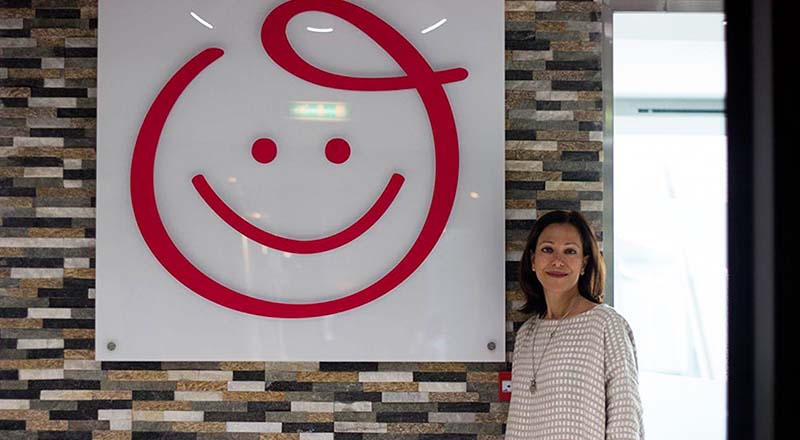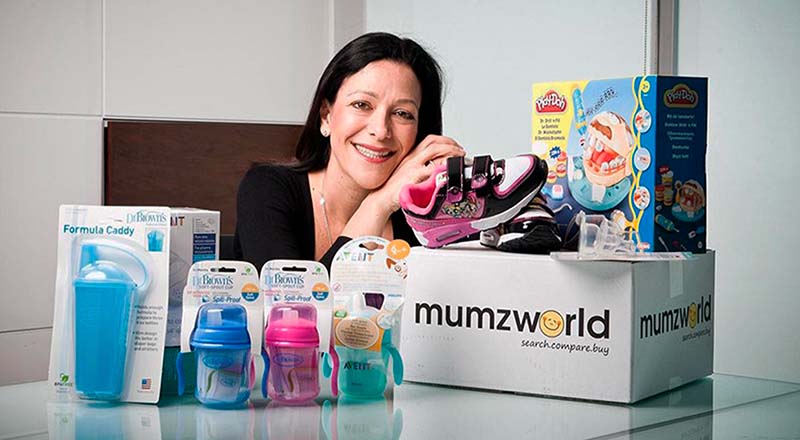
“What is the legacy you want for yourself? What do you want out of your life? Will what you seek bring you closer to that legacy? Then you have to do it, regardless of the outcome.”
This, says Mona Ataya on her Mumzworld website, is what anyone who wants to start and start their own business, company or project should ask themselves. That was also what she asked herself in 2011, when she created what would become the largest online marketplace for mothers in the Arab world, an achievement that was recognized by the United Nations Conference on Trade and Development (UNCTAD) when she was recently elected as one of the six champions of the e-commerce for women.
In order to face a project of your own, Ataya says, the main thing is the passion and fervent conviction that the idea you want to implement will have the necessary impact to create the legacy you want. “Is the idea important enough for you? Is it worth it? Usually, a worthwhile idea is bigger than oneself. It's a story of social impact, it's an idea that impacts others.” That was his idea.
The drive to improve and pursue her goals has accompanied her since she was a child: in her childhood she played tennis, rode horses and did athletics. Sports, he reflects, are important because they teach to commit and motivate. He learned from everything he did. In college he graduated with a double bachelor's degree: in Marketing and Finance. He then worked in world-renowned companies. His first job, while still studying, was at Procter & Gamble, in the United States: “I was thirsty to learn,” he recalls. Then, he joined the competition: Johnson & Johnson.
While working there, her brother Rabea summoned her with a tempting offer: he invited her to “revolutionize the way people looked for and applied for jobs in the Middle East.” And they both founded Bayt.com. The millennium began, the internet was beginning to revolutionize communication in the world and thinking of a website to look for and get a job sounded like something out of a futuristic film. Her brother had experience as an entrepreneur, had formed a team with all the necessary skills and she left safe work and a career on the rise and took “a leap of faith” to begin the path of entrepreneurship. The first of many.
Bayt.com started with “a sofa, a desk and a minimum budget” and within a few months it became a widely used recruitment site in the region. In just over a decade it became the largest in the Arab world. The jump had been worth it.

Motherhood, unmet needs and an unstoppable idea
When Ataya became a mother — she has three children, two of them twins — she warned that in the Arab world there was a gap in the market for products destined for the world of parenting: there was no variety in the supply, prices were high and there was no information for people to make conscious decisions about their shopping. That hole is what lit it up.
“Mumzworld was born out of a passion and a vision, to create something that was important to me, personally, and to mothers at the regional level. As a mother of three, I didn't feel empowered to make the right decisions. Other mothers are hungry for information, risk aversion, want the best for their children so they are constantly looking for information to choose and make the right decisions,” says Ataya on the company's website.
“And when I had my children,” he continues, “access to choice was limited, prices were very high, and getting to the right product at the right time was also very difficult. Information in Arabic on these products was virtually non-existent. I felt like my hands were tied. And so it was that the seed was sown to build this business.”

The road was not easy, it was undermined by difficulties and challenges, but Ataya made a business plan without losing sight of the goal. “I started writing it wishing: I wish there was a place that had everything I need under one umbrella; where I could search, compare and buy. I would like you to give me objective, transparent and real information so that I can make informed decisions. And I would like to find a community to identify with, relate to, that could give me advice and guide me, because as a mother you are a lonely human being, you have a responsibility that falls only on you.”
Starting a business from scratch as a mother of three children, then young, was challenging. What made it no longer go back was, she says, only one thing: to be sure that if the idea came to life it would make an impact: “Even if it makes a mother or two feel empowered, I've done my job.”
Today, his company reaches the homes of more than 2.5 million people, with the largest supply of products in the region, at the best price, since his policy is that all his products are sold at the cheapest price on the market. If someone finds somewhere else a product from the Mumzworld catalog at a cheaper price, they can communicate it and the company matches it immediately.
That, says Ataya, is one of the reasons why his business is unique. The other two are the variety of their offerings — with 300,000 products for sale on the website — and a team responsible for providing information about those products, both in Arabic and English.

Thus, with more than 350 employees and 6,000 brands, in a decade Mumzworld became the destination that many companies around the world want to reach to sell in the Middle East and a reference and inspiration business for other women. Mumzworld empowered women who are mothers on both sides of the counter: as users and also as workers of the company. They make up 70% of the team.
“We found phenomenal women who are heads of logistics, marketing. And we were able to find them because mothers can relate to us, because I went out to say 'I am a mother, I have three children'. My co-founders are mothers, our head of technology is a mother and everyone can be one and work at their own pace. Because as a mother or father your work should not deny your responsibilities at home, but rather complement each other. That's why we hire a lot of women with flexible hours, many who work from home, we have a large group that is in Saudi Arabia and even Palestinian editors who are in the West Bank writing from home.”
The entrepreneur says that from Mumzworld they made an investment aimed only at women who had to or chose to stop working when they became mothers and wanted to re-enter the labor market without leaving their children all day. “The option of involving women in the workforce after they have had children is deeply rooted in our DNA as a company,” she says.

Include women in e-commerce
In addition to being a founding partner and managing director of Mumzworld, Ataya has been on the Board of Directors of the Dubai Chamber of Digital Economy since 2011, has spent two decades working on issues related to the digital economy in the Middle East and North Africa and, in 2013, she was named among the 100 most powerful Arab women by Arabian Business, a Dubai business magazine with a focus on global and regional news.
In his years of work he saw digital commerce born and rise to the top, although he says he still has a lot to grow. She also saw the obstacles faced by women who wanted to investigate in this area, in the Middle East and stressed the need to add them to the world of the digital economy and e-commerce, where they are still a minority. The challenge remains to make room in a male-dominated sector (“from suppliers to delivery and finance companies”).

“When we started Mumzworld, the e-commerce ecosystem was underdeveloped. For someone to be successful as an e-commerce buyer, the ecosystem has to support them, that is, messaging services are needed to be able to deliver in two days, online payment systems have to work, a technological talent has to be readily available, everything that did not exist”, recalls Ataya from the beginning.
“Now,” he continues, “there are a million women on our website who interact with our community, we are participating in social media, we have mother ambassadors who talk about their experiences. We have truly created a comprehensive 360-degree community.”
Her dream, “that mothers have access to everything at their fingertips, at the push of a button, and that this really helps them feel empowered to make the best decision for themselves and their sons and daughters.” Yet, he assures, you can grow much more.
___
This note is part of the Solutions for Latin America platform, an alliance between INFOBAE and RED/ACTION
Últimas Noticias
Debanhi Escobar: they secured the motel where she was found lifeless in a cistern
Members of the Specialized Prosecutor's Office in Nuevo León secured the Nueva Castilla Motel as part of the investigations into the case

The oldest person in the world died at the age of 119
Kane Tanaka lived in Japan. She was born six months earlier than George Orwell, the same year that the Wright brothers first flew, and Marie Curie became the first woman to win a Nobel Prize

Macabre find in CDMX: they left a body bagged and tied in a taxi
The body was left in the back seats of the car. It was covered with black bags and tied with industrial tape
The eagles of America will face Manchester City in a duel of legends. Here are the details
The top Mexican football champion will play a match with Pep Guardiola's squad in the Lone Star Cup

Why is it good to bring dogs out to know the world when they are puppies
A so-called protection against the spread of diseases threatens the integral development of dogs




